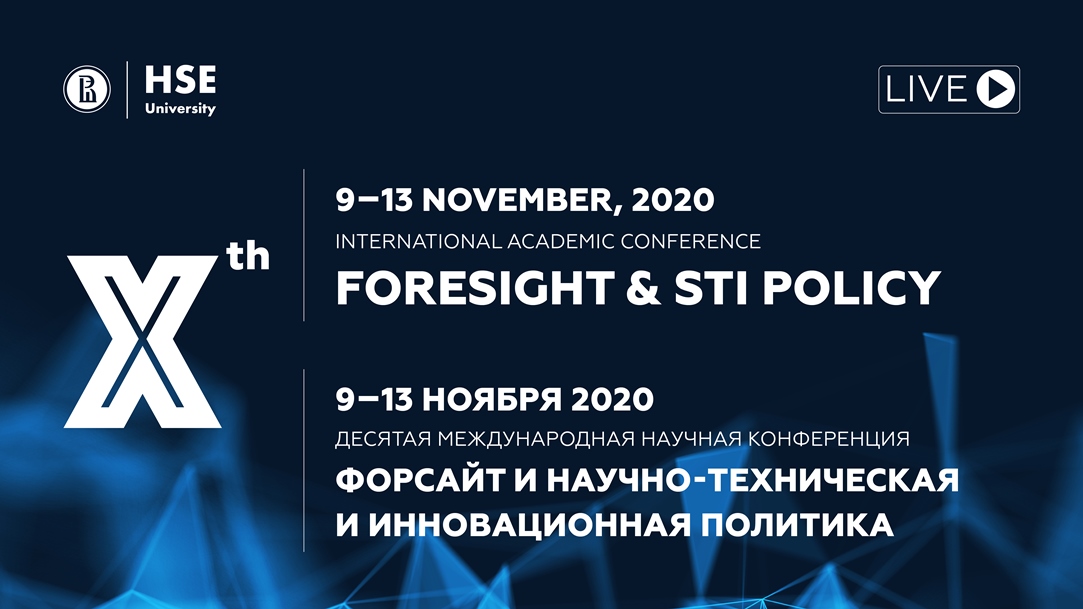Post-COVID-19 Future Scenarios to Be Discussed at Anniversary HSE Foresight Conference

From November 9 – 13, the HSE Institute for Statistical Studies and Economics of Knowledge is organizing its Tenth International Academic Conference ‘Foresight and STI Policy’. The conference has been acknowledged by OECD as one of the world’s most important forums of foresight researchers. It will the tenth time that the conference brings together Russian and international experts from the leading think tanks, research centres and universities, national ministries and government bodies, development institutes and high-tech companies from over 20 countries.
The conference will be held online for the first time and will be mainly focused on discussing the new challenges and the pandemic-related changes in the foresight research and STI policy agenda.
2020, which has been marked by COVID-19, has drawn the attention of many people, even those not involved in foresight studies, towards forecasts and scenarios. With harsh realism, it has revealed the meaning of one of foresight’s key terms: in expert and media reflection, SARS-CoV-2, with its radical impact on all economic and social processes, has often been called a ‘wild card’, or an event with a very low probability and a huge impact.
Questions as to whether such events can be predicted at all, what tools should be used to analyze them and their potential consequences, how they can be taken into account in formulating state policies, business plans and long-term strategies, have always featured prominently at all Foresight Conferences since 2011. At the anniversary conference, these issues will be discussed from the perspective of a decade’s worth of foresight research experience with the aim of assessing pandemic response in different countries and sectors of economy.
On November 9, participants of the ‘Post-COVID Future: What Foresight Can Tell Us’ and ‘Big Data for the Future: Instruments and Applications’ sessions will look at the impact of the pandemic on the speed of technology implementation (taking Japan as an example), as well as the role of foresight tools in implementing the ‘green agenda’ in the European Union and in supporting decision-making in power industry as used by the World Energy Council. A number of presentations, including ones by HSE University researchers, will be dedicated to the growing opportunities offered by intellectual big data analysis and AI applications in foresight studies and solving STI policy tasks.
Scenarios for the development of COVID-19 pandemic, application of big data for administration and foresight in the increasingly complex society, and proactive approaches in foresight research implementation will be discussed at November 10 sessions: ‘Foresight: Future Trends and Disruptions’ and ‘STI Policy: How It Will Change after COVID-19’. There will also be several presentations on the results of public opinion surveys on the attitudes to science and advance technology, as well as the analysis of practices for creating a sustainable research and innovation ecosystem based on cooperation and long-term forecasting (building on the experience of South Korea, Finland, and OECD).
On November 11, the conference will feature a special workshop 'Prospects of Science and Technology in BRICS Countries'. Its participants will discuss the ongoing work on the Sixth Science and Technology Foresight in China; cooperation priorities in research and development and the BRICS countries’ global positioning from the perspective of reinforcing scientific production (particularly, Brazil’s experience); the opportunities for upgrading the educational system in the context of the changing technology landscape (through the example of India), and the correlation between foresight and STI policy (in South African practice).
Speakers of the special workshop 'Being Human in the 21st Century' (Nov. 12) from HSE University, National University of Singapore, University of Manchester (UK), and the School of Biomedical Engineering, Science & Health Systems, Drexel University (USA) will present their forecasts for the future of humans and the humanity in the context of recent research in neuroscience and health.
Participants of the special workshop ‘Technological Upgrading’, which is scheduled for November 13, will discuss the principles of the national innovation policies that promote technological breakthroughs; heterogeneity and barriers for innovation development, its resources and drivers, particularly in terms of recommendations for developing economies, as well as the opportunities for STI cooperation.
A detailed programme is available on the conference website.
Working languages: Russian and English (with simultaneous translation).
Participation in the conference is free of charge. No registration fee.
Registration for participation in Zoom is open until November 6. Since the virtual conference hall in Zoom has limited capacity, all sessions will be broadcast on YouTube (links to be published on the conference website the day before the event).
In you have questions about participation, please contact: Elena Nasybulina (enasybulina@hse.ru), Dmitry Uzlov (duzlov@hse.ru), or Olga Maximova (omaximova@hse.ru). If you are a journalist, please contact Elena Gutaruk (egutaruk@hse.ru).
